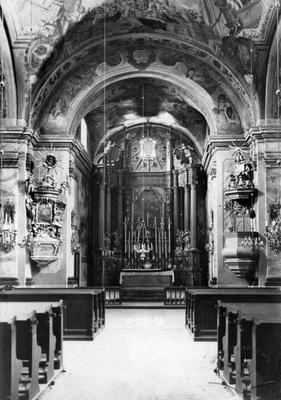
St. Martyn church interior
- ID: 84
- Place: Lviv
- Date: 1908
A fragment of the interior in one of the rooms of the Sztuka (“Art”) coffeehouse, which was located in 10 Teatralna St. from the early twentieth century up to 1918. The inscription on the postcard indicates that this was the “Room of the Seven Gods. God of Purity”. The coffeehouse’s interior was decorated in 1908 following a project of the artist Feliks Wygrzywalski, who was one of the most remarkable Secession artists of Lviv. According to Yurii Biriuliov, Ph. D., most renowned expert on the Secession in Lviv: “… Of the café’s four rooms the “ladies’ salon” created the greatest artistic effect. The wall decorations by Wygrzywalski – “Indian Art”, “Wonder-Child”, “Ars longa”, “Vita brevis” created a tetraptich of sorts, with a ‘neo-myth’ on early twentieth century art in Lviv. The wall-painting was executed in broad general planes with a rhythmic composition of groups of figures. The furniture, candelabra, window-drapes with applications, and sculptures by Kurczyński in the niches were all subordinated to the placement of the wall decorations…”. The coffeehouse was located in one of the oldest streets of central Lviv in a building with a rich history, which was constructed in 1768-1773 by architect Piotr Polejowski. The sculptural décor of the façade (with allegorical figures of Mars and Venus, mascarones and decorative elements) was performed in 1850 by Paweł Ojtele. Wanda Monne, the fiancee of A. Grotther spent her childhood years in the house. Beginning in 1886 a permanent exhibition of the United Association of Art Lovers of Cracow and Lviv was placed in the rooms of the second floor; at the same time the building housed the School of Practical Professions for Women, organized by the Women's Work Society. Until 1892 the building also housed Władysław Gubrynowicz's and Władysław Schmidt's bookstore. During the First World War the Sztuka also housed the so-called 'affordable cuisine' – an invention of the Lviv City Council and its then-head, Dr. Tadeusz Rutowski. The “Affordable Cuisine” in Sztuka offered affordably-priced food for Lviv's intelligentsia in wartime.